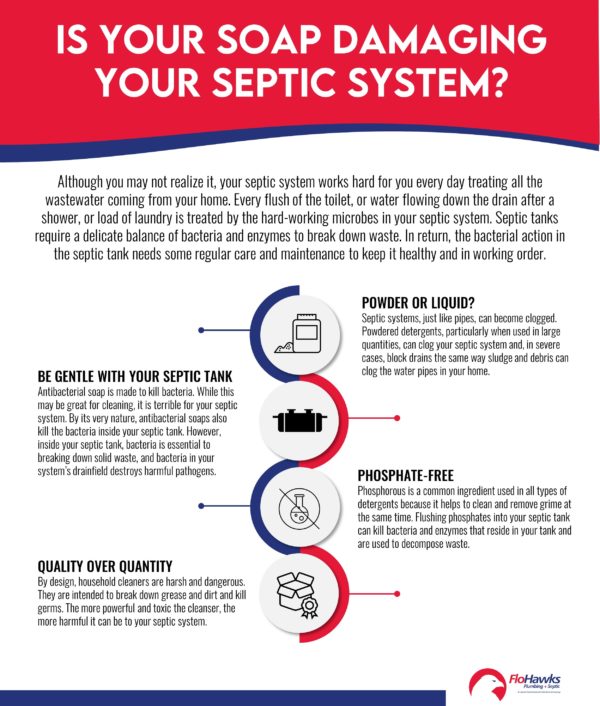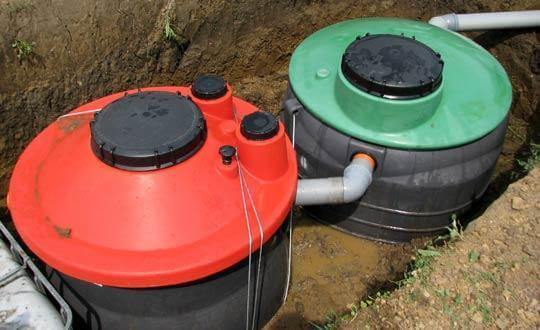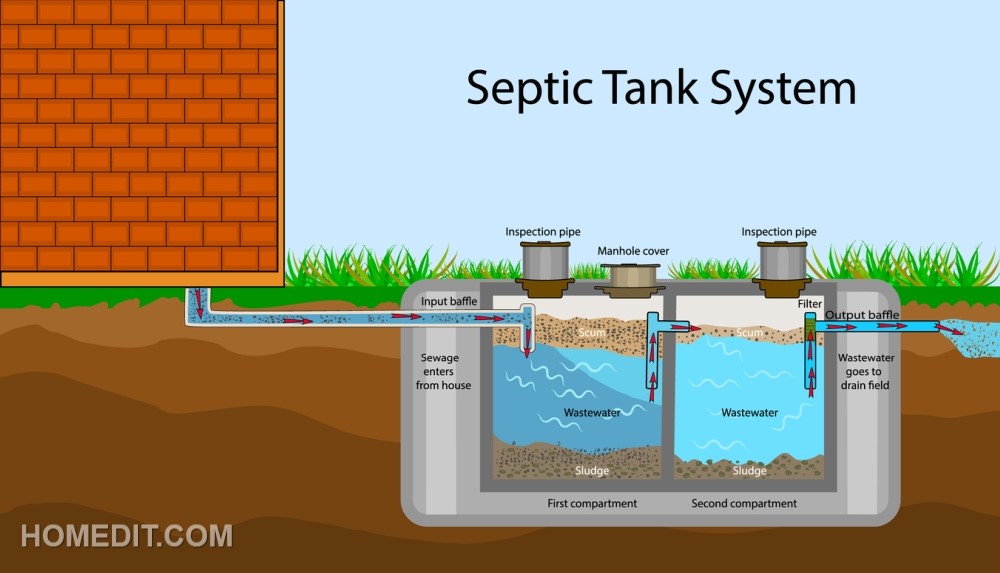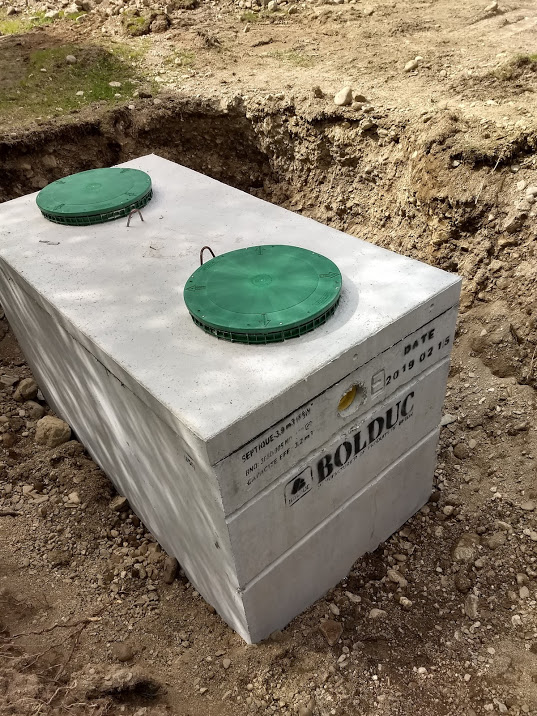Living in a home with a septic tank brings about questions and concerns regarding daily routines. One common query that arises is whether it is safe to shower every day without causing any issues to the septic tank. Understanding the impact of daily showers on a septic system is crucial for maintaining its efficiency and longevity. Let’s explore this topic and find out if you can shower everyday with a septic tank.
Benefits of Using a Septic Tank
Avoiding reliance on public sewage systems
Using a septic tank provides you with the freedom and independence from relying on public sewage systems. Rather than being connected to a centralized sewer system, a septic tank allows you to treat and store your household wastewater on your own property. This means that you are not subject to any restrictions or regulations imposed by the municipal sewage system, giving you more control over your waste management.
Lower cost and less maintenance
One of the major benefits of using a septic tank is the cost savings it offers. When you have a septic tank, you eliminate the need to pay monthly sewer fees to the municipality. Additionally, septic tanks require less maintenance compared to public sewage systems. With regular maintenance and proper care, a septic tank can last for decades without any major issues, resulting in significant long-term savings.
Environmentally friendly
Using a septic tank is an environmentally friendly choice for managing wastewater. Septic tanks facilitate the natural breakdown of solid waste through anaerobic processes, reducing the amount of harmful pollutants that enter the environment. Unlike public sewage systems, which rely on large-scale treatment plants, septic tanks work on a smaller scale, minimizing the overall ecological impact. By opting for a septic tank, you contribute to the conservation and preservation of the environment.
Understanding the Functioning of a Septic Tank
Storage and treatment of household wastewater
A septic tank is designed to store and treat the wastewater generated in your household. All the wastewater from your sinks, toilets, showers, and laundry flows into the septic tank. Inside the tank, the solid waste settles to the bottom while the liquid portion is separated and gradually released into the drain field for further treatment. This process allows for the natural breakdown of the waste materials, ensuring effective treatment before the released water returns to the groundwater.
Breakdown of solid waste through natural processes
The primary function of a septic tank is the decomposition of solid waste through natural processes. Bacteria present within the tank break down the solid waste, converting it into simpler substances, such as water and gases. This decomposition occurs in an oxygen-depleted environment, known as anaerobic digestion. The byproduct of this process is known as “sludge,” which gradually accumulates in the tank and must be pumped out periodically to prevent it from reaching levels that could impede the proper functioning of the septic tank.
Proper maintenance and care
To ensure the optimal performance of your septic tank, it is crucial to practice regular maintenance and proper care. Maintenance tasks include regular inspections, pumping out accumulated sludge, and monitoring the overall condition of the tank and drain field. It is also important to avoid depositing excessive amounts of non-biodegradable materials, such as grease, chemicals, or sanitary products, into the septic tank. Following proper maintenance guidelines will help prolong the lifespan of your septic tank and prevent potential issues.
Effects of Excessive Water Usage on Septic Tanks
Increased risk of system failure
Using excessive amounts of water can put your septic tank at a higher risk of system failure. When too much water enters the tank in a short period, it can overwhelm the system’s capacity to treat and disperse the wastewater. This leads to the accumulation of solid waste in the tank, reducing its effectiveness and potentially causing backups or overflows. It is important to maintain a balanced water usage to avoid straining your septic tank.
Overloading the drain field
The drain field plays a crucial role in the treatment of wastewater from the septic tank. Excessive water usage can overload the drain field, preventing it from effectively absorbing and filtering the water. When the drain field is overwhelmed, the excess water may surface, leading to soggy areas, foul odors, or even sewage backup in severe cases. By being mindful of your water usage, you can prevent the drain field from becoming overloaded and ensure its proper functioning.
Reduced effectiveness of waste breakdown
A septic tank relies on natural processes to break down solid waste. Excessive water usage can disrupt these processes by diluting the bacteria responsible for waste decomposition. When the bacteria are diluted, they become less effective at converting the solid waste into simpler substances. As a result, the waste breakdown process is hindered, leading to the accumulation of sludge and potentially causing blockages or backups within the system. By controlling your water usage, you can maintain an optimal environment for efficient waste breakdown.
Water Usage Considerations with a Septic Tank
Average water usage per person per day
When you have a septic tank, it is important to be aware of your average water usage per person per day. According to the Environmental Protection Agency (EPA), the average water usage by an individual is around 80-100 gallons per day. This includes all activities requiring water, such as flushing the toilet, showering, doing laundry, and washing dishes. By being mindful of your daily water consumption, you can prevent excessive strain on your septic tank.
Factors influencing water usage
Several factors can influence your water usage with a septic tank. The size of your household, the number of bathrooms, and your daily routines all play a role in determining how much water is consumed. Additionally, the efficiency of your plumbing fixtures and appliances, such as low-flow showerheads and water-saving toilets, can help reduce water consumption. Being conscious of these factors can help you adjust your habits and optimize water usage, benefiting both your household and septic tank.
Importance of conserving water
Conserving water is not only beneficial for the environment but also for the proper functioning of your septic tank. By conserving water, you reduce the amount of water entering the septic tank, minimizing the risk of overload and allowing for effective waste treatment. Simple actions such as fixing leaky faucets, taking shorter showers, or using efficient appliances can significantly contribute to water conservation and the longevity of your septic tank.

Showering Frequency and its Impact on Septic Tanks
Effects of frequent showers on septic tanks
Frequent showers can have a noticeable impact on the performance of your septic tank. Showers consume a significant amount of water, and if not properly managed, they can overwhelm the septic tank with excessive water in a short period. This can lead to the accumulation of solid waste and hinder the natural breakdown process, potentially resulting in backups or system failures. It is essential to understand the appropriate showering routine to avoid straining your septic tank.
Determining an appropriate showering routine
To determine an appropriate showering routine for your septic tank, it is important to consider your household’s water usage, habits, and the size of your septic tank. If you have a larger household, it may be necessary to spread out the showers throughout the day to avoid putting excessive strain on the system. Additionally, shorter showers and utilizing water-efficient showerheads can help reduce water consumption and lessen the impact on your septic tank.
Reducing water usage while showering
Reducing water usage while showering is a simple yet effective way to minimize the impact on your septic tank. Using water-efficient showerheads can significantly decrease water consumption without sacrificing the quality of your shower experience. These showerheads are designed to maintain a strong water pressure while using less water per minute. Additionally, practicing shorter showering times and turning off the water while lathering or shampooing can further conserve water and alleviate stress on your septic tank.
Proper Shower Maintenance for Septic Tanks
Use of water-efficient showerheads
Using water-efficient showerheads is not only beneficial for reducing water consumption but also for maintaining the health of your septic tank. By installing these showerheads, you can conserve water without compromising the quality of your showers. Water-efficient showerheads restrict water flow, ensuring that your septic tank is not overwhelmed with excessive amounts of water. This helps maintain the proper balance within the system and supports efficient waste treatment.
Avoiding excessive showering time
Excessive showering time can contribute to increased water usage and strain on your septic tank. It is important to be mindful of the length of your showers to avoid overwhelming the system. Consider setting a timer or using a shower playlist to keep track of time and ensure you do not spend more time in the shower than necessary. By being conscious of your showering habits, you can conserve water, reduce stress on your septic tank, and promote its long-term functionality.
Repairing leaky pipes and faucets
Leaky pipes and faucets can not only waste water but also put additional stress on your septic tank. Even minor leaks can lead to a significant amount of water loss over time, contributing to overload and potential system issues. It is important to promptly repair any leaks in your plumbing system to ensure efficient water usage and prevent unnecessary strain on your septic tank. Regularly inspecting and maintaining your plumbing system will help identify and address any leaks before they become major problems.

Additional Measures to Protect Your Septic Tank
Monitoring water usage from other activities
While showering is a significant contributor to water consumption, it is important to monitor water usage from other activities as well. This includes using water-efficient appliances, such as washing machines and dishwashers, as well as limiting excessive water use in activities such as gardening or filling swimming pools. By being aware of your overall water consumption and seeking ways to reduce it, you can protect your septic tank and ensure its efficient operation.
Proper disposal of chemicals and hazardous substances
Proper disposal of chemicals and hazardous substances is essential for the health of your septic tank. Certain chemicals, such as bleach, harsh cleaning agents, or paint thinners, can disrupt the natural processes within the septic tank, affecting its ability to treat wastewater effectively. It is important to dispose of these substances according to local regulations and avoid pouring them down drains or toilets. By practicing responsible chemical disposal, you can maintain the integrity of your septic tank and prevent potential damage.
Regular inspection and pumping
Regular inspection and pumping are crucial for the long-term functionality of your septic tank. It is recommended to have your septic tank inspected every 3 to 5 years by a professional to assess its condition and identify any potential issues. Additionally, pumping out the accumulated sludge on a regular basis, typically every 3 to 5 years, is necessary to prevent its build-up and maintain the efficiency of the system. By staying proactive with inspections and pumpings, you can ensure the optimal performance of your septic tank.
Signs of Septic Tank Issues
Slow draining sinks and toilets
If you notice that your sinks or toilets are draining slowly, it may be a sign of a septic tank issue. This can indicate a blockage or excessive accumulation of solid waste within the tank. Slow draining is often accompanied by gurgling sounds or bubbles in the drains. If you experience these symptoms, it is important to address them promptly to prevent further damage to your septic tank and avoid potential backups.
Foul odors in the area
Foul odors in the area surrounding your septic tank or drain field can be a strong indication of a septic tank problem. If you detect unpleasant smells, it suggests that there may be a leak, a clog, or a malfunction within the system. Foul odors can also arise from the accumulation of gases produced during the breakdown of organic matter in the septic tank. Any persistent or strong odors should be investigated by a professional to identify and resolve the underlying issues.
Pooling water or lush vegetation near the drain field
If you notice pooling water or unusually lush vegetation near the drain field, it may indicate that your septic tank is experiencing difficulties. Pooling water suggests that the drain field is not effectively absorbing and dispersing the treated water, potentially resulting in backups or system failures. Similarly, an overly green and thriving vegetation in the drain field area may indicate an excessive nutrient load, signaling a disruption in the waste breakdown process. These signs should not be ignored and must be addressed promptly to prevent further damage.

Consulting a Professional for Septic Tank Advice
Seeking guidance from a septic system expert
When it comes to managing your septic tank, seeking guidance from a septic system expert is highly recommended. Septic system professionals possess the knowledge and expertise to assess the condition of your tank, troubleshoot issues, and provide valuable advice on maintenance practices. They can help you understand the specific needs of your septic tank and offer tailored recommendations to ensure its optimal performance. Consulting a professional will give you peace of mind and help you make informed decisions regarding your septic system.
Getting regular inspections and maintenance
Regular inspections and maintenance are instrumental in ensuring the longevity and functionality of your septic tank. As mentioned earlier, scheduling routine inspections every few years allows professionals to assess the system’s condition, identify potential problems, and address them before they escalate. Additionally, following a maintenance schedule that includes pumping out the accumulated sludge as recommended by the professional will prevent issues related to solid waste build-up. By staying proactive with inspections and maintenance, you can avoid costly repairs and maintain a healthy septic system.
Choosing the right septic tank size
Choosing the right septic tank size is vital to accommodate your household’s water usage adequately. Installing a tank that is too small for your needs can lead to frequent overflows and system failures, while an excessively large tank may result in inefficient waste treatment and unnecessary expenses. Consulting a septic system expert will help you determine the appropriate tank size based on your household’s water consumption and ensure that your septic system functions optimally.
Conclusion
With proper understanding, maintenance, and water usage considerations, you can shower every day with a septic tank while maintaining its functionality. The benefits of using a septic tank include avoiding reliance on public sewage systems, lower cost and maintenance, and being environmentally friendly. By understanding the functioning of a septic tank, its treatment processes, and the importance of regular maintenance, you can ensure its optimal performance. Consider the effects of excessive water usage, showering frequency, and proper shower maintenance to protect your septic tank. Additional measures, such as monitoring water usage, proper disposal of chemicals, and regular inspections, contribute to the long-term functionality of your septic tank. If you encounter any signs of septic tank issues, consulting a professional is recommended to address the problems promptly. By prioritizing water conservation, regular maintenance, and taking necessary precautions, you can enjoy your daily showers without harming your septic tank and ensure its efficiency for years to come.
